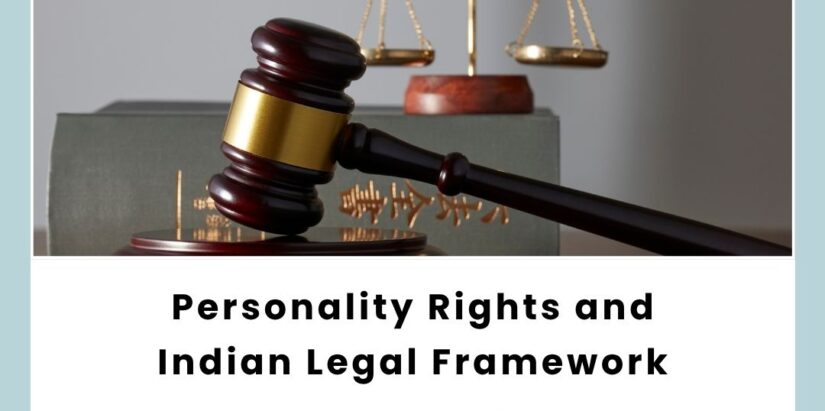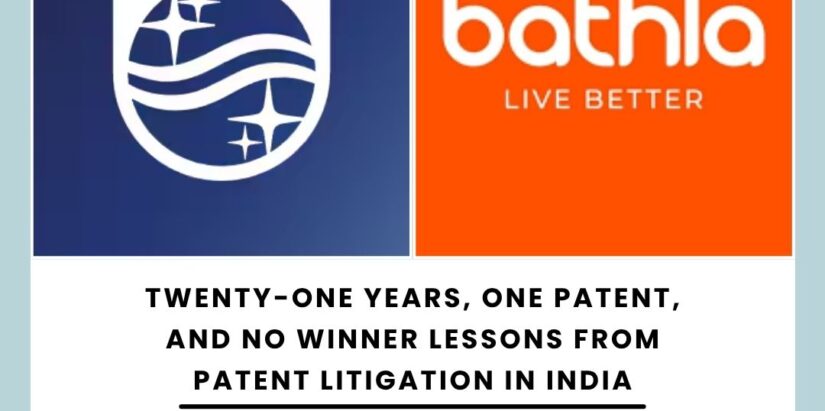By: Sahil Srivastava, Legal Intern, Brainiac IP Solutions
Introduction
In current timeframe, the identity of an individual is considered as important as money. Therefore, it is equally essential from legal and moral perspective to protect the identity of an individual. Identity of famous personalities like celebrities, sportsperson is often misused without their consent for commercial gains. In current time, identity of even private individuals is not safe. With the recent evolution of AI and deepfakes, digital imperfections can steal their identity. Despite these rising concerns, India does not have any specific legislation to save personality rights. Personality rights in India are generally co-related with Right to Privacy and other laws relating to Intellectual Property. Therefore, it is a dire need of a new specific legislation controlling the personality rights of an individual. The article highlights the various challenges associated with personality rights, thereby emphasising the necessity for a comprehensive and distinctive legal framework governing personality rights in India.
Meaning of Personality Rights
Personality Rights are the legal protection for the personality of an individual. It protects the commercial use of the identity, name, image, voice and over other unique traits. These rights allow the individual to control the use of their identity against any wrongful gain toothers. These rights include the economic benefits associated with the identity of an individual.
Natural rights are the basic rights every person has by birth, such as right to life, liberty and dignity. From this point of view, personality rights are seen as part of person`s individual freedom, which should be protected by law. From an economic point of view, personality right act as Intellectual Property Rights.
For example- Mr. Virat Kohli is a public figure. His face, name and signature are part of his personality. Imagine a company started selling coffee mugs with face and signature of Mr. Virat Kohli printed on them without his consent. Even though he is a public figure, his face, name and signature are part of his personality which have commercial value and belongs to him. So, if someone uses his personality and make money without his consent, it violates his personality right.
For another example, if someone imitates or produce Ai generated voice of Mr. Amitabh Bachchan Sir and makes commercial gain without his consent, this would be a violation of the personality rights of Mr. Bachchan.
In India personality rights are recognised through judicial interpretation of different cases.
- Rajagopal vs State of Tamil Nadu [1] was one of the major landmark cases which recognised Personality Rights in India. In this case Supreme Court recognised the right to control the commercial use of an individual`s identity within the ambit of the right to privacy.
In International level, Helan Laboratory vs Tops Chewing Gum[2] was the first major case which established that individual had a property right in their identity.
[1] Rajgopal vs State of Tamil Nadu, (1994) 6 SCC 632
[2] Haelan Labs, Inc. vs Topps Chewing Gum, Inc. 202 F.2d 866,868 (2d Cir. 1953) United States
Constitutional Foundation
Article 21 of the Constitution: The interpretation of Article 21 on personal liberty includes the safeguarding of Personality Rights. In R Rajagopal vs State of Tamil Nadu, as mentioned earlier in the article, the Hon`ble Supreme Court established that personality rights are protected under the right to privacy and are derived from the fundamental right to life and personal liberty under Article 21 of the Constitution.
K.S. Puttaswamy Judgement[1]: This landmark judgment on privacy changed the whole scenario and established a new strong foundation for personality rights. In accordance with Articles 14, 19 and 21 of the Constitution, the nine-judge bench declared Privacy to be a fundamental right, enshrined a constitutional framework in regard to the notion and protection of personality rights.
Justice Chandrachud’s judgment says that privacy means having the freedom to make your own choices about your personal life and information. This idea supports the right of every person to control how their name, image, or personal details are used. The judgment also explains that privacy is closely linked to human dignity and independence, showing that these rights come naturally to every person, not just from laws.
The Puttaswamy judgement also identified important limits on privacy rights, stressing that privacy interests should be balanced against other constitutional values and legitimate governmental interests. This balancing approach has significant implications for personality rights, such that protection must balance conflicting interests, including freedom of expression, artistic freedom, and the public’s interest in information.
[1] KS Puttaswamy vs Union of India (2017) 10 SCC 1
Other Legislations
Trademark Acts, 1999: The Trademark Act has become the principal legal framework for the protection of personality rights in India. Sec 29 of the act protects the Trademark infringement. Judicial bodies have used this section to protect the images, voice, identity of the famous personality as protectable trademarks.
The judgment of Titan Industries Ltd vs Ram Kumar Jewellers[1], in which Plaintiff, Titan Industries had a contract with the actors Mr. Amitabh Bachchan Sir and Mrs. Jaya Bachchan Mam for using their images for the advertisements of his jewellery brand ‘Tanishq’. The defendant also used the images of these celebrities for the advertisement of his jewellery. The plaintiff thus sued the defendant for using the same images without consent. The court issued an injunction against the defendant citing that the use of identity of celebrities for commercial gain without their consent is infringement of their personality rights.
Copyright Act, 1957: The act protects indirectly personality rights through provisions of moral rights of authors and performers. Section 57 grants the author right to claim authorship and prevent distortion or misuse of their work. Section 38-38B grant performers the right to credit and prevent prejudice to their performance. These provisions allow individuals to control the use of their creative identity and reputation against unauthorised or misleading use.
Information Technology Act, 2000: The act does not explicitly mention about the personality right but it safeguards the digital identity of the individual. Different sections of the acts protect the digital identity of user. Section 66C of the Act penalises the identity theft. It restricts the person from using the signature, passwords or other unique identification features of the user.
Section 66D penalises the cheating by impersonation by using different computer resources. For example- using AI for producing the voice of the individual for personal or commercial gains.
Section 66E penalises the violation of privacy by capturing, publishing, transmitting the private preferences of a person. This section is relevant for misuse of a person`s likeness, especially in cases involving deepfakes and morphing.
[1] Titan Industries Ltd vs Ram Kumar Jewellers 2012 (50) PTC 486 (Del)
Current Challenges
Misuse of AI and Deepfakes: In simple terms, a deepfake is a fake photo, video or audio created with Ai. This Ai generated deepfake looks and sounds very real and can easily mislead the public. The advance deepfake technology possess a significant threat on the identity of the individual. The AI creation of images, voice, audios, videos can possess significant threat on the individual. It can create confusion in the layman`s mind and can completely tarnish the reputation of the individual. For ex- Using the face of a Bollywood actress in sexually explicit content without her knowledge and consent. It clearly tarnishes the image of the actress and violates her personality rights.
Legally, deepfakes create new problems that current personality rights laws can’t easily handle. Older laws assume that a real person is behind the misuse of someone’s identity, but with AI, many people could be involved such as the creators, platform owners, or users. Also, since deepfakes can be made and spread very quickly and in large numbers, the old legal methods for stopping misuse no longer work well.
Liability of Platforms and Social Media
Social media platforms have become lead venues for infringements of personality rights, including examples like fake celebrity endorsements and unauthorized fan sites that generate commercial gain. The sheer and worldwide nature of the platforms creates enforcement challenges that single victims struggle to cope with through traditional legal channels. Indian courts have grappled with problems of platform liability and the extent to which intermediaries are liable for user-generated content violating personality rights. In Shreya Singhal v. Union of India[1] petitioner primarily challenged the Sec 66A of Information Technology Act,2000 which criminalises sending offensive messages through communication services. The petitioner argued that the provision was vague, overbroad and violated the freedom of speech and expression under Article 19
(1)(a). The case was not directly related to personality rights, but it provided principles balancing between frere speech and protection of identity online. The right to freedom of expression also entails responsible expression, and content related to invading someone`s privacy can still be restricted under Art 19
(2). The judgment indirectly safeguarded the personality rights (reputation, dignity, induvial, autonomy) by ensuring that the restrictions on speech affecting such rights must be certain and reasonable.
[1] Shreya Singhal v. Union of India (2015) 5 SCC 1
Final Remarks
This article underscores the pressing necessity for proper legislation for the personality rights. The current existent methods are based on different legislations but still they have been proved insufficient in tackling the complex issues related to personality rights. The Puttaswamy Judgement has also recognised the fundamentals of Personality rights. Therefore, it has been a dire need of the hour to constitute a separate new legal framework for the tackling the complex issues of Personality Rights.
The new framework should be more focused on providing values to individual autonomy, human dignity not only with respect to celebrities, but should also covered the private individual.




